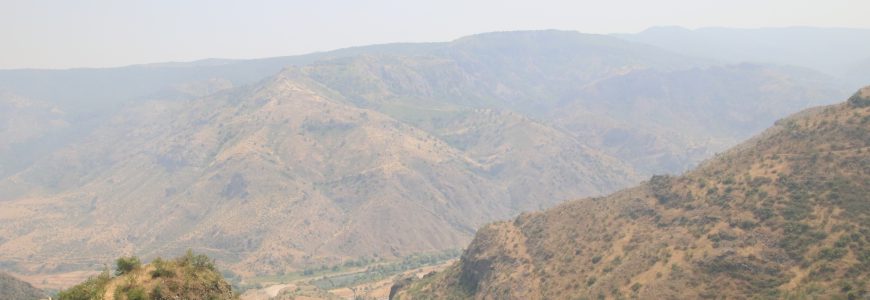The closure of Armenia’s main north-south highway has continued into its second day, in what appears to be yet another instrument of pressure that Azerbaijan is using on Yerevan in order to exact further concessions following its victory in last year’s war.
Azerbaijani soldiers continued to block two sections of the road connecting two of southern Armenia’s main cities, Goris and Kapan, on August 27. The road blockages have cut off three villages along that road, and interrupted international transit with Iran; the road that has been blocked is the only way that Iranian vehicles can get to and from the rest of Armenia.
Azerbaijani officials have maintained a studied silence about the road closure, though hours before it started Baku reported an attack on one of its soldiers by two Armenian soldiers in the area; Armenia has denied that any such altercation took place.
But the longer the blockade lasts, the more it appears to be yet another deliberate twisting of the screws by Azerbaijan, which has over the last several months exerted a steadily escalating pressure on Armenia in order to force Yerevan to sign a final resolution of the conflict on Baku’s terms: namely, renouncing any claim over Nagorno-Karabakh, the Armenian-populated territory in Azerbaijan.
“The situation is going to get worse before it gets better,” said Richard Giragosian, the head of the Yerevan think tank Regional Studies Center. “Armenia has nothing to offer in terms of real concessions or compromises that Azerbaijan wants. Azerbaijan is the one that doesn’t feel the pressure to stop the escalation.”
The list of instruments that Azerbaijan had been using to effect that pressure had already been a long one: playing hardball with the return of Armenian prisoners in Azerbaijani custody, making rhetorical territorial claims against Armenia, making military incursions slightly inside Armenian territory, and dialing up the frequency of cross-border exchanges of fire. Now, add to that the closure of this key road.
It hasn’t been reported exactly where the Azerbaijani troops have been blocking the road, but there are many parts of the highway that run through bits of Azerbaijani territory. Until last year Armenian forces had occupied all that territory – their spoils from the first war between the two sides in the 1990s – meaning that Armenian traffic could pass through those sections undisturbed. But following Armenia’s defeat in last year’s war, Azerbaijan regained control of the territory and quickly reestablished its sovereignty over its sections of the road.
Until now that sovereignty has been expressed only symbolically, with flags, border guard posts and signs reading “Welcome to Azerbaijan” in English and Azerbaijan (but not Armenian). Baku now looks ready to act on it.
Even as official Baku has remained silent, hawkish analysts have celebrated the road closure. “Azerbaijan has allowed the use of its road for transportation, as an act of good will. But if the Armenians commit provocative acts, then Azerbaijan has the right to take appropriate measures,” said Azerbaijani analyst Togrul Juvarli in an interview with Caucasian Knot.
“Yesterday, what all Azerbaijanis have long dreamed of has happened,” wrote an Azerbaijani who blogs under the name Wind from Absheron. “Azerbaijani soldiers blocked the section of the road […] connecting the Armenian cities of Kapan and Goris.” The blogger noted that there is another road through Azerbaijani territory that Armenians use: the Lachin corridor connecting Armenia with Nagorno-Karabakh. “Our society also demands the closure of that road [the Lachin corridor]; both belong to Azerbaijan, and we have no peace agreement with Armenia because the Irevan side doesn’t want peace,” the post concluded, using the Azerbaijani spelling for the Armenian capital city.
The closures have effectively marooned the residents of three small villages in between the closed sections of the road. The mayor of one, Shurnukh, told Caucasian Knot that they have been getting deliveries of bread from Goris facilitated by a Russian military escort. (Russian border guards patrol the road, with posts set up on the Armenian side of the border.)
The blockade also has stranded “hundreds” of Iranian trucks, transport company officials told Sputnik Armenia. It also has disturbed internal communications: The head of one Armenian trucking company said that he normally has 50 trucks a day transporting about 1,000 tons of copper concentrate from mines in Syunik to Yerevan. “Our trucks that went to Syunik for copper concentrate are stuck there and can’t return back,” said the official, Gagik Agajanyan of the company Apaven.
Several Armenian officials have reported that Russian border guards have been facilitating negotiations between the two sides. The deputy governor of Syunik, however, told local media that the Azerbaijani forces are refusing to negotiate with their Armenian counterparts, demanding only to speak to the Russians.
Russian officials have yet to comment on the ongoing blockade, but Giragosian said that Moscow likely will be the key actor in resolving the issue. The ceasefire statement that ended last year’s war was brokered by Russian President Vladimir Putin, and while Baku can easily turn the screws on Armenia in its weakened state, with Moscow it runs the risk of going too far in undermining the ceasefire, Giragosian said.
“The real key is in Moscow, not in Yerevan,” the analyst said. “That is, Azerbaijan is dangerously approaching a red line, a limit of Russian patience, because this is very much a move by Azerbaijan to challenge the Russian-imposed ceasefire agreement as much as it is a challenge to Armenia.”
Joshua Kucera is the Turkey/Caucasus editor at Eurasianet, and author of The Bug Pit.

